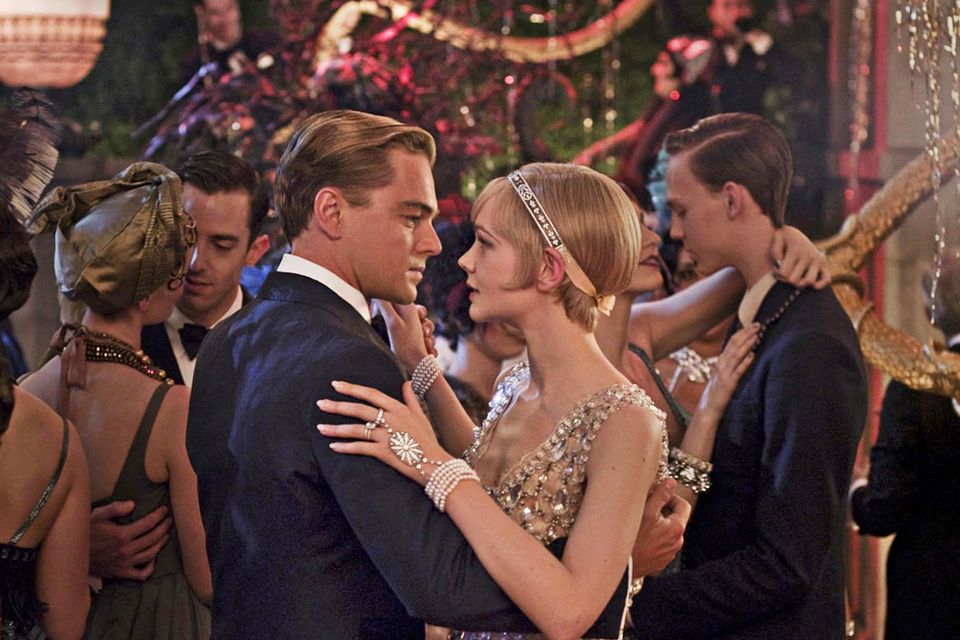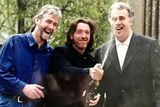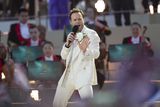Podcast detectives hunt the real-life bootlegger believed to have inspired The Great Gatsby
Joe Nocera on his new podcast investigating Max Gerlach, the small-time crook upon whom F Scott Fitzgerald may have based flawed protagonist
Leonardo DiCaprio as Jay Gatsby and Casey Mulligan as Daisy Buchanan in the 2013 film version of The Great Gatsby
First published in 1925, The Great Gatsby still sells half a million copies a year. Both a brilliant evocation of the Jazz Age in all its exhausting glory and a satire of a country obsessed with money and power, F Scott Fitzgerald's novel is lauded as one of the greatest ever written in English. His editor Max Perkins described it as "a story that ranges from pure lyrical beauty to sheer brutal realism".
Jay Gatsby, one of the most celebrated characters in modern literature, has everything. He is young, handsome and rich. He throws the best parties. He is from the right background and knows all the right people. But as narrator Nick Carraway learns more about Gatsby, he begins to realise that much of what he has been telling people about himself is untrue: a second layer of fiction is hidden within the fiction. Which makes it even more surprising to learn that the novel has a real-life origin story.
In 1951, a small-time crook and bootlegger called Max Gerlach suggested that he was the inspiration for Gatsby. His claim fell on uninterested ears, and when he died in 1958, the mystery of the link between him and Gatsby died too. In a new eight-part investigative podcast, American Dreamer: Who was Jay Gatsby? (Audible, all episodes available), veteran reporter Joe Nocera and producer Poppy Damon take up the case.
“I had never heard of Max Gerlach until I started working on this podcast,” Nocera tells me. “I definitely saw it as literary detective work. I went down a lot of rabbit holes searching for information about this or that obscure — but invariably fascinating — person who was in some way connected to Gerlach. Whenever we found something, it was like we had found a gold nugget in the Sierra Mountains.”
The first burning question was whether Fitzgerald knew Gerlach. The answer, is definitely yes, Nocera says. “One of the leading Fitzgerald scholars, Matthew Bruccoli, discovered a note Gerlach wrote to Fitzgerald in the early 1920s. ‘En route from the coast,’ it read. ‘Here for a few days’ business. How are you and the family, old sport?’ Old sport was, of course, Jay Gatsby’s catchphrase. That’s the first and strongest piece of evidence, and we follow the trail from there.” In the novel, Gatsby uses ‘old sport’ 42 times.
“Figuring out who’s who in a novel is just plain fun,” Nocera says. The fascinating trail he follows takes in the shady world of Prohibition-era bootlegging, the Mob, the love story behind Gatsby and the truth behind the great American Dream.
“The American Dream, I’ve come to believe, is not just one thing,” he says. “I am a baby boomer, a child of the World War II generation. My parents’ American Dream was to own their own home, raise their children and have a steady, middle-class job. For others, the American Dream was being the first in their family to go to college and ‘make it’ in elite society. For others, it was about getting rich, whether legally or not. Max Gerlach had a unique American Dream:, to be seen as a real American — even though that was a lie. Whatever else you can say about him, he did succeed in doing that.”
That Fitzgerald threw nothing away is a boon for archivists, so Nocera has plenty of material with which to explore parallels between Fitzgerald and Gatsby as well as those between Fitzgerald and Gerlach. For example, Fitzgerald was fixated on social class and wealth, and so was his character. Gatsby describes himself as a military man. What do you know: when Nocera and Damon go through service records, they discover that so was Gerlach. Nocera keeps on digging, and finds that Gerlach’s record was neither as stellar nor as close to the frontline as it first appeared (“If Max had a war, it was a very short one,” he notes drily in Episode 2, Then Came The War).
As with the same team’s last hit podcast, Agatha Christie and the Dandelion Poisoner, American Dreamer is an engaging combination of gumshoe detective work and investigative journalism. Nocera cheerfully knocks on doors in search of clues, no matter how small or insignificant they might seem. One of the leading scholars he interviews is Horst Kruse, a 95-year-old retired professor of American literature who spent decades investigating the connection between Gatsby, Gerlach and Fitzgerald.
Featuring interviews with academics, authors and private investigators, the series blends scholarship with the dramatisation of incredible characters (both real and fictional), and music and effects are used to create an immersive and cinematic sound design. An enjoyable aspect of Nocera’s approach is that just when you think he’s delivered the crucial piece of information he was working up to, he reveals yet another dark corner to explore or page to turn.
“Sentence for sentence, there isn’t a better-written book in the English language,” Nocera believes. The Great Gatsby is a novel in which fiction and fact dance around each other, and reality and illusion change places
“What is it that Jay Gatsby wants? He wants an illusion — a dream of a love affair he once had that he thinks is more real than it probably was. He wants to be accepted by ‘old wealth’ — another illusion. He wants to make money illegally but be accepted as an upstanding member of society — illusion number three. Dreams based on illusions usually burst. That is what I think is the message of The Great Gatsby.”
Join the Irish Independent WhatsApp channel
Stay up to date with all the latest news















